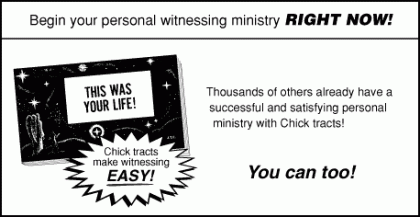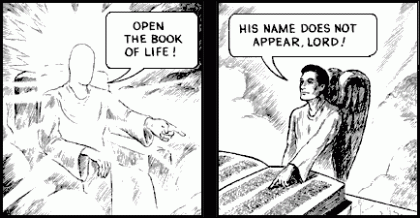The Trouble with Jack Chick
Devra Torres | Aug 7, 2017 | 3 cmts
When I was a 7-year-old member of an Evangelical-shading-into-Fundamentalist congregation, I once handed out Jack Chick tracts door to door. It was raining, and I remember feeling that this probably proved I was a pretty dedicated Christian.
What are Jack Chick tracts, and why am I horrified now to remember my part in disseminating them?

They're little black and white cartoon booklets, tools for spreading the Gospel as understood by a certain brand of Protestantism: the "accept Jesus Christ as your personal Lord and Savior" and "once saved, always saved" brand. You can buy them online to this day, at 17 cents apiece.
The theology isn't all bad. It's simplistic and incoherent, and not truly Biblical, despite the verses sprinkled generously throughout the little pages. Some tracts, like "The Death Cookie," are viciously anti-Catholic, but not only that: some contain footnotes leading to nonexistent passages in Church documents (apparently counting on the reader being so impressed by the sheer proliferation of footnotes that he feels no need to follow up). Not a case of well-intentioned error. But there are two more reasons--more personalist reasons--to object to the things.
The first problem is the way they're usually dispensed anonymously. When I used to go door to door, I wasn't supposed to stay and discuss them or form any kind of relationship with the "target." I was just supposed to get them into as many hands as possible. (True, I was seven, but I think this was the norm for "witnesses" of any age.)
Some people hand them out on street corners, and some leave them in subways or in public libraries, trusting the Holy Spirit to see to it that they fall into the right hands. It's not that the Holy Spirit can't manage that, just that this sort of thing just doesn't exhaust the mission to go out into all the earth and spread the Good News.

My pastor in Ann Arbor, Fr. Ed Fride, tells about the time he was handed one of the classics--"This Was Your Life"--with its harrowing story of a self-satisfied sinner who dies unprepared and is called before the Judgment Seat. There he's compelled to watch a movie of himself, from birth to death. His name found missing in the Book of Life, he's consigned to Hell for all eternity.
Fr. Ed (or just "Ed," at the time--he wasn't even Catholic yet) was ripe for conversion and ran after the guy, seeking the wisdom he'd need to save his own soul from hellfire. But the guy was no help. "I don't explain 'em, man, I just hand 'em out," he declared laconically.
The second objection is what you might call the "excessive objectivism" objection. Some of the tracts are flat-out deceptive propaganda. But in "This Was Your Life," the plot is straight out of the Bible. It's objectively true, in its broad outline, anyway. Yet something's...off.
God is pictured as a faceless giant, sitting on a throne and impersonally passing judgment. There's no beauty in Him, no love, no fellow-feeling, only alarming bigness. Because of the assumption that only those who have visibly, obviously accepted Jesus as their personal Savior may be saved, there's no room to consider whether the Gospel message was conveyed to people in a way they can "hear." They accept Him or they don't. Too late for nuance (unless you count one character who protests before the Judgment Seat that he didn't know his religion was wrong and is refuted by being made to recall the time when God arranged for him to be offered a tract--presumably one of Chick's own--and he refused it).There's something unremittingly grotesque about the pictures--even for a comic book, even when they're pictures of utterly unsympathetic characters. 
It's true--in the end, your name is written in the Book of Life or it isn't. Once Judgment Day arrives, it's too late for second chances. I'm sure Jack Chick thought he was doing people a favor to refuse to sugar-coat these things.
Still, something's very much off. I think it comes down to that obliviousness about the person.
What do you think?

Comments (3)
Rhett Segall
Aug 10, 2017 10:32am
Jack Chisk's theology can find support from the reading of certain scriptural passages in isolation. Sadly, the Roman Catholic Church has also fallen into such isogesis. As you note, such an approach misses the personalist awareness of the Subject's relation to God's Word.
When I was 15 years old I asked our parish priest if it were true that outside the Church there is no salvation. He didn't answer but responded:
"It is very easy to commit a mortal sin. Now a mortal sin can be erased in only two ways. 1) through an act of perfect contrition or 2) Imperfect contrition with the sacrament of confession. and since only Catholics have the sacrament of confession, well, poor Protestants! (P.S.-this was nearly 60 years ago!)
Catholics are wiser today. Interestingly, a theology professor noted that the Church, in playing down mortal sin, lost the sense of death. How so? Well, If I think my not going to Mass on Sunday constituted a mortal sin I would be alert to the possibility of death and eternal loss. From a personalist point of view I think there is something that has been lost in the ubiquitious theology of God's mercy, i.e. a sense of urgency regarding salvation!
Devra Torres
Aug 10, 2017 11:13am
It's true, downplaying mortal sin is no way to do anybody any favors! And yes, we do want to keep moving away from the Chick-like way of blithely assuming that the vast majority of people are damned because they had no way of encountering the truth, or because they were given one chance and blew it.
I don't want to be presumptuous or push presumption, but I think there's more truth in the Russian parable of the onion: if I remember right, a woman's soul is about to be damned, but she cries out, Wait! Once I gave an onion to a poor man! and the onion is let down from Heaven so she can pull herself up by it. But then another soul tries to grab the onion, and she says, "No, no, it's MY onion!"--and THEN she's damned.
Rhett Segall
Aug 11, 2017 11:08am
Thanks for reminding me of the onion story, Devra! In the same vein as the Russian parable is the story of the fellow, invited into heaven, who asks if he might first see what hell is like. It consists of a banquet table with sumptuous foods but the people sitting around the table, emaciated and bitter, have eating utensils fixed to their hands in such a way that it is impossible to eat. The fellow goes to heaven where he sees the exact situation but here the participants are happy and well nourished because they are feeding each other.
The moral. of course, is the same as the onion fable.
Sartre said "Hell is other people." So is heaven. It depends on our view of persons and whether or not we're willing to share.